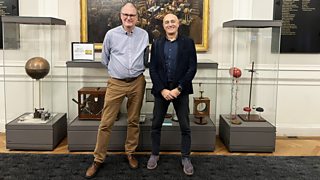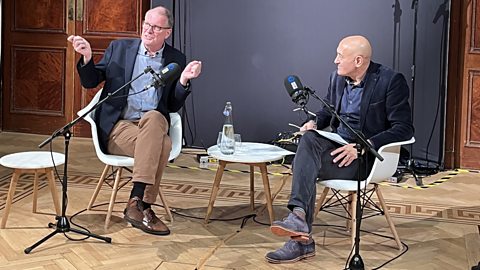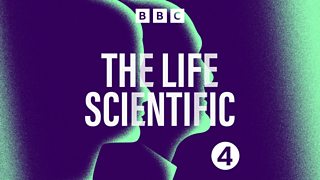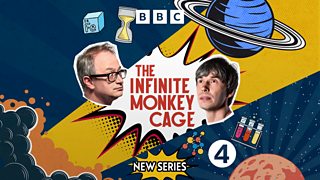Artificial Intelligence – no longer a thing of science fiction

AI is asserting its place in society, with the future of technology revolving around how we develop, channel and control these intelligent systems. Facial recognition software, translator apps, deep fakes - navigating the world of tomorrow requires understanding AI.
In this 300th episode of The Life Scientific, host Jim Al-Khalili seeks to demystify the AI uprising with the help of Prof. Michael Wooldridge in front of a live audience at London’s Royal Institution.
Here are seven questions explored in their discussion…
Is our fear of AI justified?
Our fascination with AI dates back to the Greeks, whose god Hephaestus fashioned a construct out of metal to protect the island of Crete. Mary Shelley later birthed literary science fiction with Frankenstein, a creature of inanimate flesh given life. And of course, more recently, we have the remorseless Terminator. These beings seem at once terrifying and captivating, creations run amok and out of our control.
There are more pressing safety issues to which we should turn our attention that Michael terms 'catastrophic risks'. Such as a self-driving plane crashing.
Unsurprisingly, fiction paints a fairly bleak, dystopian picture of AI. But Michael feels these fears are unwarranted, that “in all of the discussion about them, nobody has ever given [him] a plausible, realistic scenario for how AI might be an existential risk.” There are more pressing safety issues to which we should turn our attention that Michael terms “catastrophic risks”. These are far more mundane but likely, such as a self-driving plane crashing.
How is AI already helping us?
AI is certainly not a thing of fiction anymore, however. Over the past decade, everyday applications of AI have taken off. The most successful and often forgotten example is automated translation apps, such as Google Translate. Thanks to large language models, we’re able to quickly translate between over one hundred languages with comprehensible accuracy. ChatGPT can also be used to brainstorm ideas by relating words to one another and spitting out responses that are easily parsed.
Can AI help us live longer?
Moving forward, AI can help us in many other ways too. Crucially, the medical field is primed for AI assistance as a diagnostic tool. The Apple Watch can already perform ECG scans, and future tech could analyse blood sugar levels, stress levels and even spot dementia before human physicians. Additionally, a lot of medical research data is tabulated for papers and then passed over by the scientific community. This is a gold mine: AI could scan through these papers for patterns and report back unnoticed findings by collating data.

Can AI pass as human?
One of the hot button topics in AI development is the obsession with creating an AI that can trick humans into believing that it too is human. Computer scientist Alan Turing’s 1950 paper established this supposed threat by posing an existential question: “Can machines think?” As popularised by the 2014 film The Imitation Game, Turing developed the Turing Test for computer sentience. Essentially, Turing posited that if a human chatting with a computer via keyboard could not differentiate the computer’s responses from that of a human’s, then the computer is “intelligent”.
But we have stricter standards for sentience now. AI capability is differentiated into two branches: Weak AI and strong AI. Weak AI is indistinguishable from a human, but it does not "understand" in the same way we do. As Michael puts it: “Suppose you’re having a conversation with ChatGPT and you go on holiday for a week. ChatGPT is not wondering where you are… it’s a computer program which is paused mid-loop. It’s not aware of the world in any meaningful sense.” Michael assures us that even with the most modern AI of today, there is no consciousness operating under the hood.

In what way is AI similar to the human brain?
Despite the rapid adaptations of AI systems such as large language models, we still can’t outperform the human brain. Michael reminds us that “the human brain is just the most amazing thing in all of creation. And we’re not remotely close to understanding how it works.” Neural networks are an AI technology inspired by how the brain transmits information, but replacing neurons with something approximating microcomputers. But even these neural networks aren’t aiming to replicate the human brain; after all, we don’t need technology that expresses emotions such as regret or self-doubt.
Does AI power self-driving cars?
Self-driving cars filter through a huge mass of incoming information to make their judgements. This includes camera footage for object detection and infra-red radars that differentiate between a human and, say, a stop sign. But none of this involves AI. Instead, self-driving cars are essentially using pattern recognition to decide what course to take. This involves human researchers spending thousands of hours out on roads feeding the system new information about situations that it might later encounter while operating alone.
Turning the tables...

The ChatGPT challenge
ChatGPT asks Mike Wooldridge what fictional AI product he would call into existence.
How will AI change law and science?
Of course self-driving cars and AI do share one issue in common: a raft of legal implications. Lawmakers are increasingly turning to academics and computer scientists to guide their hand in crafting new legislation. With potentially defamatory technology such as deepfakes and the life-threatening implications of medical AI, courts need an entirely new system for assigning responsibility between AI users and AI makers.
AI also totally overhauls our current method for performing research. As Michael puts it, “[AI] is this supermassive black hole that is just distorting everything in science because it is giving you fundamentally new ways of doing things. Ways that we just didn’t imagine before.” We need to find a way to empower ourselves with AI, while still holding true to the scientific method to gather impartial results. This idea of human discretion regarding AI, whether it’s in law or science or any other facet of society, is crucial to employing this rapidly advancing technology in a responsible, productive manner.
To discover more about the people behind the science that's changing our lives, head to Ö÷²¥´óÐã Sounds and explore hundreds more freely available episodes of The Life Scientific on Ö÷²¥´óÐã Radio 4.

More science on Radio 4
-
![]()
The Life Scientific
Professor Jim Al-Khalili talks to leading scientists about their life and work.
-
![]()
What makes a good scientist?
Jim Al-Khalili celebrates 10 years of The Life Scientific by asking some great thinkers.
-
![]()
Dinosaurs becoming birds...
... like building the first aeroplane, but over millions of years.
-
![]()
The Infinite Monkey Cage
A witty, irreverent and unashamedly rational look at the world according to science, with Robin Ince and Prof. Brian Cox.




